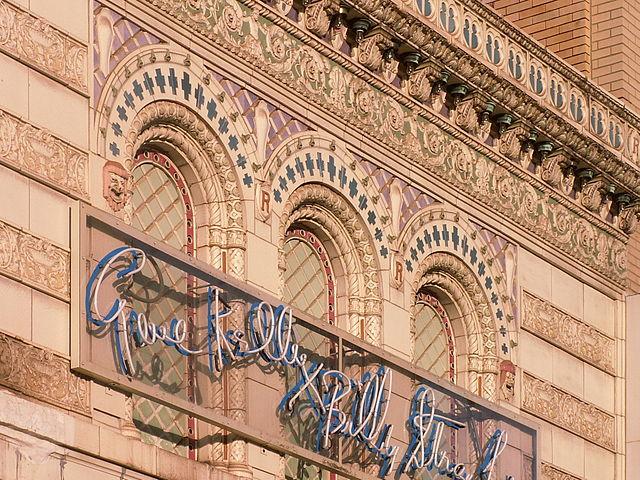‘Owning our existence while we’re here’: Kelly-Strayhorn Theater keeps performance alive in a changing East Liberty
Image via Cbaile19, Wikimedia Commons
Details on the Kelly Strayhorn Theater in East Liberty.
October 11, 2022
The lavishly adorned Regent Theater charmed Pittsburghers strolling along a prosperous stretch of Penn Avenue in East Liberty a century ago. For a few pennies, customers could enjoy a motion picture, a novel art form at the time. Art has progressed since then, and East Liberty has changed with it — the building is now the Kelly-Strayhorn Theater, and the community around it looks nearly unrecognizable.
The theater, named after Pitt alumnus Gene Kelly and Pittsburgh jazz composer Billy Strayhorn, serves as a performing space to celebrate creativity and diversity. The season premiere in September featured an immersive performance from composer Everett Saunders and choreographer Marjani Forté-Saunders exploring the role of the emcee within the ethos of hip-hop culture. Throughout the season, audiences will witness stories told through dance, music and other mediums.
Performances at the Kelly-Strayhorn Theater often push artistic boundaries. An experimental play by Alyssa Velasquez debuted last Friday, juxtaposing mangos and the Latinx experience and featuring a cast composed of people drawn from the audience. Velasquez said performing brings her closer to her cultural identity.
“Performance for me is a repatriation of representation,” Velasquez said.
Joseph Hall, executive director of the Kelly-Strayhorn Theater, said the theater aims to create an inclusive forum centered on social justice and artistic innovation in East Liberty.
“The Kelly-Strayhorn Theater is a home for creative experimentation, community dialogue and collective action rooted in the liberation of Black and queer people,” Hall said. “It extends well beyond people who identify as that. Our freedoms are entwined, are entangled together. I am not free unless you are free… that’s how I see Kelly-Strayhorn’s mission living — we welcome everyone to the theater who believes in that mission, who will uphold that inside of our doors.”
The neighborhood of East Liberty, north of Oakland, has undergone drastic change in recent decades. Once a predominantly Black community and a center of Pittsburgh’s commerce and culture, East Liberty experienced redlining and urban renewal throughout the past century. In recent years, new development has forced residents to confront the threat of gentrification.
Hall said many low-income people face the prospect of displacement, and the Kelly-Strayhorn Theater acts as an ambassador for a concerned community.
“We welcome development that centers the people … where there are people, there is value, no matter what,” Hall said. “What folks should critique is the depletion of resources through government programs, through development, through gentrification — that is where value has been lost, because the culture was extracted… As a microcosm, we are a reflection of the larger systemic displacement and disinvestment that has happened.”
To fight back against gentrification, Hall said, the Kelly-Strayhorn Theater harnesses creativity as a form of resistance.
“Culture is the soul of a community and art is the expression of that soul,” Hall said. “Art gives us a pause, in a way, when we are sitting in a theater with each other, or experiencing an immersive project, or in a museum staring at a painting, we get to jump out of ourselves … that’s what art can do for communities, and when we think about social justice, so much of that is actually imagining a new world for ourselves.”
Simon Phillips, education coordinator for the theater, said the Kelly-Strayhorn Theater’s mission lives within the intersection of art and inclusivity.
“Performance is the expression of an idea within a moment. Theater offers an exploration of ideas while creating the atmosphere to experience sensations collectively,” Phillips said. “As East Liberty changes, [the theater] continues to be a home for marginalized folks seeking a taste of such liberation through radical authentic expression.”
However, like many East Liberty institutions over the years, the Kelly-Strayhorn Theater is facing displacement. The building’s lease will expire in 2029, and without concrete assurances that the theater will survive, Hall said the future is rife with uncertainty.
“We are working hard to secure our space, secure our future – our vision and our strategic plan is owning our future, thriving where we live, and we see that through the lens of our building, our home,” Hall said. “Kelly-Strayhorn is a direct reflection of the residents’ battle to own their future … I can talk about brick and mortar, but for me it goes well beyond that. It’s about owning our existence while we’re here.”
Many Pitt students’ sole impressions of East Liberty come from bus trips to Target and Whole Foods. Hall said that needs to change, and the theater is a megaphone for East Liberty to tell Pittsburgh its story.
“There were homes in the spots that we frequent… there was a whole existence before we were here,” Hall said. “I would want [Pitt students] to know about Kelly-Strayhorn’s role as a cultural center, as a community hub, as a place that helps bring an identity to a neighborhood, as a place that values folks of various backgrounds and identities, of a place that values all of our liberation — and that gets sticky, and challenging, and twisted, but we’ll figure it out together.”



